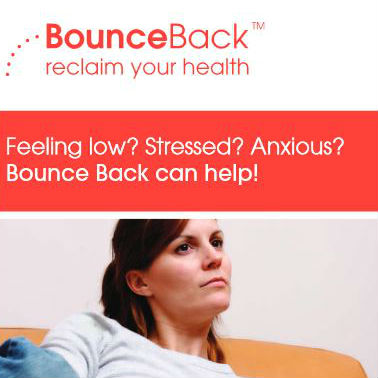Sometimes we seek escape and solace from a pint of beer, a smoke, or even a bucket of Ben & Jerry’s to help us deal with life’s challenges. For some, it’s a daily routine of self-management; for others, it’s a battle between life and death. How we use substances is often linked to how we manage our mental health.
According to the Canadian Mental Health Association (CMHA), about half of those with addictions have mental illnesses and vice versa. Depression and anxiety are known risk factors and consequences of substance use problems.
A common and effective approach to managing substance use, as well as depression and anxiety, is cognitive-behavioural therapy (CBT). CBT helps provide a set of positive coping skills, and is the principle behind CMHA’s Bounce BackTM: Reclaim Your Life program, funded by the BC Ministry of Health, and available for free across BC by doctor referral.
The program uses a telephone-based adaptation of CBT to teach participants how thoughts, emotions, behaviours, and the external environment affect one another in every situation. It is designed to help people experiencing symptoms of mild to moderate depression, but also helps them learn to build a healthy relationship with substance use. Participants explore questions such as: Why do I feel the way I do? Am I using alcohol or other drugs just to get a good night’s sleep? What would recovery look like?
By exploring these and other questions participants learn to identify positive and negative consequences of actions, gain insight into what might be leading them to turn to substances, develop problem-solving skills and take more control of their own lives.
CBT has been shown to be effective but freely accessible CBT treatments are mostly limited to online information rather than practitioner-guided therapy.
Programs like Bounce BackTM offers a way to make CBT more available to people. The program provides province-wide, community-based access and integrates with primary care through family physician referral. Keys to the success of the program include support from the Ministry of Health and Doctors of BC Practice Support Program, making CBT a standard resource for BC residents.
Like any intervention, CBT and Bounce BackTM have their limitations While these types of low-intensity CBT treatment that use the relapse-prevention approach and behavioural strategies, may only have a small effect on substance use, they do show a large improvement in overall psychosocial adjustment. Therefore, making the benefits of CBT available to people across the province is a worthy goal.
To learn more about CBT visit Visions Journal’s issue on CBT from Here to Help.
To learn more about Bounce BackTM, visit www.bouncebackbc.ca.
Author: Sophy Zhang, Bounce Back Program Assistant at Canadian Mental Health Association, BC Division
**Please note that the material presented here does not necessarily imply endorsement or agreement by individuals at the Centre for Addictions Research of BC.

